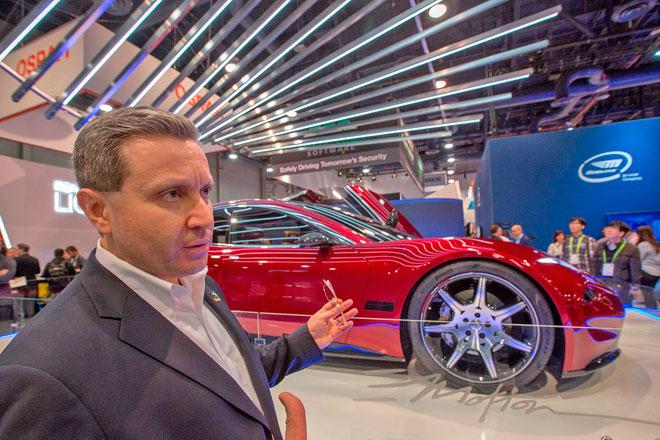You are here
With pricey electric car, Fisker eyes comeback
By AFP - Jan 10,2018 - Last updated at Jan 10,2018

Quanergy CEO Louay Eldada speaks next to a Fisker EMotion all-electric vehicle that uses LiDAR technology at CES in Las Vegas, Nevada, on Tuesday (AFP photo by David McNew)
LAS VEGAS — Henrik Fisker unveiled his $129,000 electric luxury car on Tuesday, in a rebooted effort by the renowned auto designer to take on Tesla and other luxury automakers.
The Fisker EMotion, which made its debut at the Consumer Electronics Show in Las Vegas, is part of a comeback effort for Henrik Fisker, a former BMW and Aston Martin designer whose first venture was halted in 2013 after selling only a few thousand vehicles.
This time, the company Fisker Inc. is pulling out all the stops for the vehicle, designed with butterfly doors and a sleek sportscar look, semi-autonomous driving, and a range of some 650 kilometres on a single charge.
The car, which is still two years from deliveries, “is a new take on the future of a luxury sedan”, Fisker told AFP on the CES show floor.
Fisker said the features such as the extended driving range “will make even people sitting on the fence [about electric cars] look at it”.
The new effort nonetheless faces an uphill battle in an industry where Tesla is showing rapid growth and other rivals from major automakers to startups — including one other making a debut at the tech show — are producing new electric cars.
Fisker is also working on its own battery technology aimed at improving range and speeding the charging time.
He hopes to have a charging system that can enable an extra 201 kilometres in nine minutes.
The company is also working on a solid state battery that Fisker maintained could achieve a full charge in one minute.
Taking on Tesla
Like Tesla, Fisker is also working on a more affordable vehicle that would be priced around $40,000 after the Emotion. And it has designed a self-driving shuttle bus called the Orbit that could also launch in the next few years.
Partnering with Fisker is California-based technology firm Quanergy, which is developing the LIDAR used for autonomous driving.
The Emotion uses five LIDAR sensors integrated into the body and “it’s the only LIDAR with no moving parts”, said Quanergy CEO Louay Eldada.
The launch by Fisker’s new company comes after a high-profile bankruptcy by Fisker Automotive.
Before launching his own venture and the Fisker Karma, Fisker designed vehicles including the BMW Z8 and Aston Martin DB89.
Other firms at CES appear to be making a play for Tesla clients with electric vehicles with autonomous capabilities.
China-based startup Byton announced this week it planned to launch a $45,000 electric car featuring a “digital” lounge with a panoramic display acting as a hub for navigation, entertainment and even monitoring the health of its occupants.
Last year, Chinese-backed Faraday Future unveiled its premium electric vehicle, but since then have offered few clues on its availability.
Still, Tesla remains a target for both established automakers and startups.
“In my opinion Tesla is vulnerable,” said Jack Gold, an analyst who follows the tech sector and who was attending CES.
In addition to the companies presenting at CES, Gold said, there are a number of other Chinese firms which could use the shift in consumer trends to break into new markets.
“I think it’s a big opening for the Chinese. And the Chinese government is subsidising them.”
The electronics show is often used to debut new automotive technology even though it takes place just days ahead of the big Detroit auto show.
Related Articles
WASHINGTON — Clad in a blue t-shirt and shorts, the average-size “man” is belted into a luxury Tesla Model S for a very short ride with a ve
NEW YORK — Tesla is set to unveil the Model 3, its long-anticipated pitch to middle-class drivers and a key component in founder Elon Musk’s
The next-generation of the Chevrolet Volt, one of the first plug-in cars of the modern age, will get a load of new technology and will make its world debut in January at the North American International Auto Show in Detroit, says Tim Mahoney, chief marketing officer for Chevrolet,













